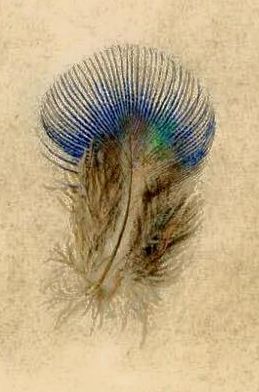War has been raging in Europe for nearly a year. In 1871, when Ruskin began writing Fors Clavigera (1871-84), his monthly letters to the workmen and labourers of Great Britain, and founded the Guild of St George, he was in part motivated by a powerful reaction against the Franco-Prussian War. In his latest Ruskin Research Blog, Stuart Eagles looks back at Ruskin’s message of peace.
THE RAINBOW OF BLOOD
By the start of the 1870s Ruskin was increasingly animated by a sense of grievance. The dragon of industrial capitalism had brought with it joyless drudgery, global injustice, self-righteous malpractice, and rampant corruption in business, politics, and even religion. It was also gobbling up the countryside, scarring its landscape, and befouling its rivers.
Worse still, the defenders of industrial capitalism sought to justify it with a false and abstract political theory that ignored social affection and worshipped only Mammon.
Ruskin felt a growing sense of foreboding. The immediate context was war in Europe (the Franco-Prussian War) and, increasingly, industrial unrest, with depressed trade and inadequate wages sparking trade-union strikes protracted by employer and government intransigence. The world seemed to be descending into chaos.
Readers of this blog could be forgiven for asking if the past really is a foreign country after all.
For his own part, Ruskin declared that he would “put up with this state of things, passively, not an hour longer” (Ruskin, 27.13).
Ruskin’s proposed remedies were many and varied, and by no means did they all look backwards, to an idealised medieval past, as many suppose.
A proper survey necessarily falls outside the scope of the current blog. So I shall mention just two, both drawn from Ruskin’s deeply rooted sense of Christian morality.
One of these remedies was his powerful notion of “glass pockets”: the idea that each and every one of us has a responsibility to be accountable not only for how we spend our money, but where we get our money from—how (indeed, whether) we earn it, and do so justly and justifiably.
Another of these remedies I addressed a little over a year ago, before Russia’s invasion of Ukraine. I explored how one of Ruskin’s Sheffield disciples proposed, in the aftermath of the First World War, a Fellowship of Serviteers. Defining itself against war-time profiteers—the sorry persistence of whom has become painfully obvious in the past twelve months—the proposed scheme drew on Ruskin’s conviction that all of us, whatever our walk of life, should put service before profit. For example, the merchant should provide goods principally according to need, and should be motivated by the same selfless sense of patriotic duty—and, Ruskin would argue, Christian mission—as the soldier defending freedom and striving for peace.
In the early 1870s, when Ruskin was engaged in the painstaking work of drawing a peacock’s breast-feather with the utmost faith and fidelity, he complained that he had to “paint as much of it” as he could, “without having heaven to dip [his] brush in”. He wrote of the “rainbow iridescence” of such divine natural beauty.

John Ruskin, “Study of a Peacock’s Breast-Feather” (1873):
Ruskin Collection (Guild of St George/Sheffield Museums).
In one of Ruskin’s letters to the extraordinary Sunderland cork-cutter Thomas Dixon—letters that were published under the title, Time and Tide (1867)—he examined “the office of the soldier” in an attempt to “gather into brief space the right laws of war”.
That letter contains some of Ruskin’s most beautiful and powerful writing.
Describing a visit to a friend of his, a microscopist whom he much admired, Ruskin confesses how that rainbow iridescence was unlocked for him when he was shown “the rainbow of the rose, and the rainbow of the violet, and the rainbow of the hyacinth, and the rainbow of forest leaves being born, and the rainbow of forest leaves dying.”
He continues:
“And, last, he showed me the rainbow of blood. It was but the three-hundredth part of a grain, dissolved in a drop of water; and it cast its measured bars, for ever recognisable now to human sight, on the chord of the seven colours. And no drop of that red rain can now be shed, so small that the stain of it cannot be known, and the voice of it heard out of the ground.” (Ruskin, 17.452)
It is difficult to imagine that anyone reading this could doubt Ruskin’s supremacy as a master of English prose. This exquisitely rhythmical blend of sight and sound exposes the ugly dissonance of blood spilt in battle. Blood that “cast its measured bars, for ever recognisable now to human sight, on the chord of the seven colours”. In war, the earth swells with the unbearable “stain” and the screaming “voice” of “red rain”.
This is a great writer giving the artist’s response to scientifically observed fact that—to his mind—reveals the vital Christian moral of nature’s divinity. It amounts to a powerful critique of the futility of war. It is a poet’s lament on bloodshed. It is one man’s plea for peace.
As a symbol, the rainbow has of course become a glorious symbol of variety, diversity and tolerance: of Life, in fact, of every hue of every colour.
In his essays on political economy, Unto this Last (1860, 1862), Ruskin summarised his philosophy another way, “THERE IS NO WEALTH BUT LIFE”, he famously declared in capital letters.
“Life, including all its powers of love, of joy, and of admiration. That country is the richest which nourishes the greatest number of noble and happy human beings; that man is richest who, having perfected the function of his own life to the utmost, has always the widest helpful influence, both personal, and by means of his possessions, over the lives of others.” (Ruskin, 17.105)
Please send feedback to contact@stuarteagles.co.uk